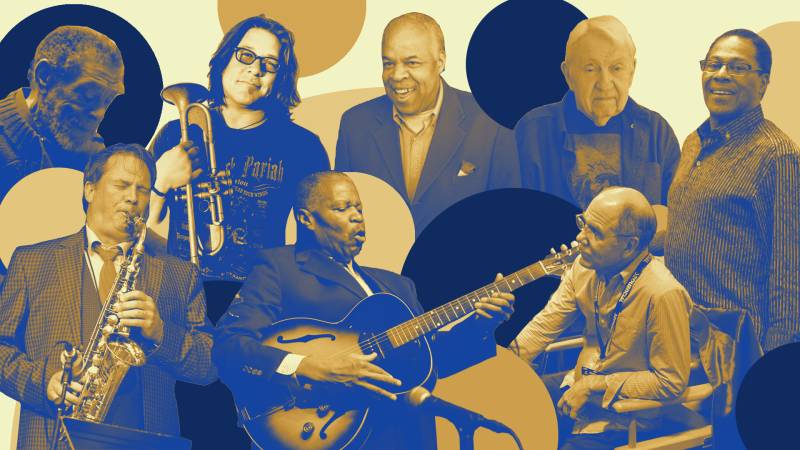While Speight preached and lived the bebop gospel, trumpeter and vocalist Rich Armstrong embodied jazz’s populist possibilities as a charismatic entertainer. He was the kind of player who became a centerpiece in any band he joined, providing a steady live-wire current with his musical ebullience. His sudden death at 55 on Oct. 7 inspired an outpouring of memories and tributes reflecting how widely he circulated on the Bay Area music scene.
Armstrong seemed to be everywhere, and every band he played with took on some of his joyous go-for-broke spirit. Those included Roberta Donnay’s Prohibition Mob Band, Lydia Pense and Cold Blood, the Blue Moon Gypsies, which he co-led, and various iterations of the Jazz Mafia collective. Jazz and funk, R&B and pop, rock and soul — Armstrong was game for anything, and had a sixth sense for adding just what any particular situation needed, like a torrid plunger mute solo with Boz Scaggs.
Oakland jazz pianist Muziki Duane Roberson’s death on Aug. 28, at the age of 76, deprives the scene of a well-traveled artist who made it a point to take younger players under his wing. A Vietnam War vet who spent 12 years as keyboard player and music director for the San Francisco Mime Troupe, Roberson was a mainstay on the Bay Area scene as a bandleader and accompanist. He mentored many younger Bay Area artists, most conspicuously through this work with the Berkeley jazz/funk/Latin/poetry group Mingus Amungus, which emerged out of Berkeley High in the mid-1990s.
The East Bay’s soul and R&B community also suffered numerous losses in 2022, starting Jan. 1 with Oakland guitarist, songwriter, producer, and label owner Marvin Holmes. A patriarch of Oakland funk as the leader of Marvin Holmes & The Uptights, he spread East Bay flavor around the nation with the 1969 hit “The Funky Mule, Part 1 & 2.” His bands served as a proving ground for generations of Bay Area musicians, and Holmes bridged musical eras when he played on several seminal Too $hort albums in the 1980s.
In a one-two punch to the East Bay scene’s gut, vocalist Freddie Hughes followed Holmes in death just two weeks later on Jan. 18. The Oakland-reared soul belter’s international renown, particularly in the United Kingdom, stood in stark contrast to his relatively low profile at home. While his recording career hit an early peak with the 1968 hit “Send My Baby Back,” Hughes played an essential role in shaping the sound of East Bay soul in an era defined by church-trained Black vocalists who brought the fervent pleas of gospel to secular settings. Hughes died at the age of 78 from leukemia and COVID-19 complications, according his son Derick Hughes (the former vocalist with Tower of Power and Roberta Flack).
With a career predating the Bay Area’s 1960s soul pioneers, reed player Richard Hadlock was one of the last figures from the trad jazz scene that flourished in the Bay Area in the years after World War II. (Thankfully, vocalist Barbara Dane is still with us). A saxophonist, publisher, journalist, historian, educator and broadcaster who long called Berkeley home, Hadlock is best known in some circles as the author of Jazz Masters of the 20s (Da Capo), a seminal book of biographical sketches first published in 1965. He died on Feb. 2 at the age of 94.
As a DJ, Hadlock introduced his Annals of Jazz show on the San Francisco station KJAZ in 1959, followed by a nearly two-decade run at on KQED. In 1982, he brought Annals of Jazz to Bay Area jazz station KCSM, resulting in a body of work that earned him the 2020 Marian McPartland-Willis Conover Award for Lifetime Achievement by the Jazz Journalists Association.
But it was as a clarinetist that he first moved to the Bay Area, when trombonist Turk Murphy hired Hadlock for his Dixieland band. Hadlock played with just about all the leading figures on the traditional jazz scene over the decades, while also teaching kindergarten in Berkeley and writing concert reviews, newspaper columns and liner notes (including a Grammy-nominated essay for a Time-Life box set on pianist Joe Sullivan).
Death also took a toll on leading figures who’ve made the Bay Area a crucial incubator of new musical technologies. Electronic music innovator Don Lewis, whose Live Electronic Orchestra system allowed him to simultaneously control multiple synthesizers and other instruments via custom keyboards, died on Nov. 6 at the age of 81. Based in Pleasanton since 1981, he worked widely across the industry, collaborating on the seminal Roland TR-808 drum machine with the company’s founder Ikutarô Kakehashi and designing sounds for the Yamaha DX7 and Hammond and ARP keyboards. In popular music, he collaborated with Michael Jackson, Quincy Jones and the Beach Boys.


